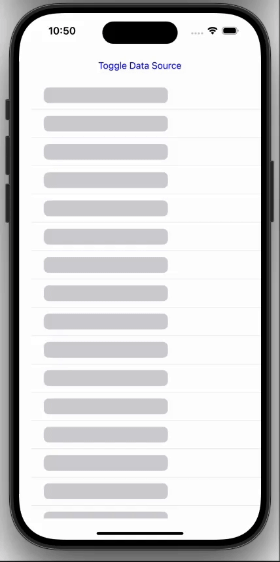UITableView, UICollectionView 的 DataSource 可以獨立一個物件
UITableViewDataSource 是可以實作一個獨立物件的,範例用 Skeleton 效果為例子
通常我們會在 ViewController 中設定 UITableView 的 Delegate 和 DataSource,並把 DataSource 的實作寫在 ViewController 中。範例如下
private lazy var tableView: UITableView = {
let tableView = UITableView()
tableView.delegate = self
tableView.dataSource = self
return tableView
}()
/// 然後在 ViewController 中實作 DataSource 的 protocol
但 UITableViewDataSource 也可以實作一個獨立物件的。
class SkeletonDataSource: NSObject, UITableViewDataSource {
func tableView(_ tableView: UITableView, numberOfRowsInSection section: Int) -> Int {
return 20
}
func tableView(_ tableView: UITableView, cellForRowAt indexPath: IndexPath) -> UITableViewCell {
let cell = tableView.dequeueReusableCell(withIdentifier: SkeletonTableViewCell.reuseIdentifier, for: indexPath)
return cell
}
}
然後在 ViewController 中設定 DataSource 即可。
private var isSkeletonDataSource = true
private var skeletonDataSource = SkeletonDataSource()
private lazy var tableView: UITableView = {
let tableView = UITableView()
tableView.delegate = self /// delegate 可以使定義在 ViewController 中
tableView.dataSource = SkeletonDataSource() /// dataSource 則是 SkeletonDataSource
return tableView
}()
/// ViewController 中切換 DataSource 的 function, 之後我們會用 button 來發動這個 function
@objc
private func toggleDataSource() {
isSkeletonDataSource.toggle()
if isSkeletonDataSource {
print("change to my data source")
tableView.dataSource = skeletonDataSource
} else {
print("change to vc data source")
tableView.dataSource = self
}
tableView.reloadData()
}
Skeleton 範例結果,使用 button 切換 DataSource

其他延伸
這個方法我是看 Unit Testing TDD 的書學到的,在書中有提到,DataSource 獨立出來,可以更好的在 Unit Test 中進行測試。不過在實際開發中,我大多是用在 Skeleton 效果上,因為 skeleton 效果和場景單純。
附錄
整個 code
SkeletonDataSource 程式碼
/// SkeletonDataSource.swift
class SkeletonDataSource: NSObject, UITableViewDataSource {
func tableView(_ tableView: UITableView, numberOfRowsInSection section: Int) -> Int {
return 20
}
func tableView(_ tableView: UITableView, cellForRowAt indexPath: IndexPath) -> UITableViewCell {
let cell = tableView.dequeueReusableCell(withIdentifier: SkeletonTableViewCell.reuseIdentifier, for: indexPath)
return cell
}
}
ViewController 程式碼
/// ViewController.swift
class ViewController: UIViewController {
private lazy var toggleButton: UIButton = {
let button = UIButton(type: .system)
button.setTitle("Toggle Data Source", for: .normal)
button.setTitleColor(.blue, for: .normal)
button.addTarget(self, action: #selector(toggleDataSource), for: .touchUpInside)
return button
}()
private var isSkeletonDataSource = true
private var skeletonDataSource = SkeletonDataSource()
@objc
private func toggleDataSource() {
isSkeletonDataSource.toggle()
if isSkeletonDataSource {
print("change to my data source")
tableView.dataSource = skeletonDataSource
} else {
print("change to vc data source")
tableView.dataSource = self
}
tableView.reloadData()
}
private lazy var tableView: UITableView = {
let tableView = UITableView()
tableView.delegate = self
tableView.dataSource = skeletonDataSource
return tableView
}()
override func viewDidLoad() {
super.viewDidLoad()
setupUI()
registerCell()
}
private func setupUI() {
view.addSubview(toggleButton)
toggleButton.translatesAutoresizingMaskIntoConstraints = false
toggleButton.topAnchor.constraint(equalTo: view.safeAreaLayoutGuide.topAnchor).isActive = true
toggleButton.centerXAnchor.constraint(equalTo: view.centerXAnchor).isActive = true
toggleButton.widthAnchor.constraint(equalToConstant: 200).isActive = true
toggleButton.heightAnchor.constraint(equalToConstant: 50).isActive = true
view.addSubview(tableView)
tableView.translatesAutoresizingMaskIntoConstraints = false
tableView.topAnchor.constraint(equalTo: toggleButton.bottomAnchor).isActive = true
tableView.leadingAnchor.constraint(equalTo: view.leadingAnchor).isActive = true
tableView.bottomAnchor.constraint(equalTo: view.safeAreaLayoutGuide.bottomAnchor).isActive = true
tableView.trailingAnchor.constraint(equalTo: view.trailingAnchor).isActive = true
}
private func registerCell() {
tableView.register(UITableViewCell.self, forCellReuseIdentifier: "UITableViewCell")
tableView.register(SkeletonTableViewCell.self, forCellReuseIdentifier: SkeletonTableViewCell.reuseIdentifier)
}
}
extension ViewController: UITableViewDelegate, UITableViewDataSource {
func tableView(_ tableView: UITableView, numberOfRowsInSection section: Int) -> Int {
return 10
}
func tableView(_ tableView: UITableView, cellForRowAt indexPath: IndexPath) -> UITableViewCell {
let cell = tableView.dequeueReusableCell(withIdentifier: "UITableViewCell", for: indexPath)
cell.textLabel?.text = "Cell \(indexPath.row)"
return cell
}
}
